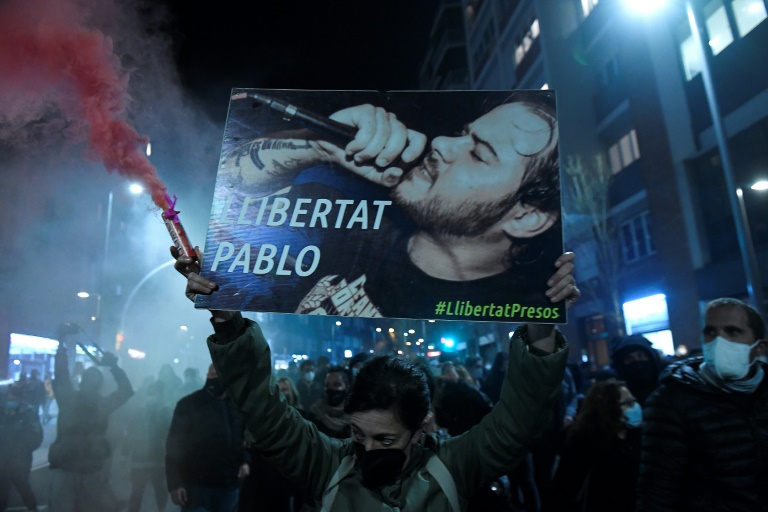“Tomorrow it can be you”
Regardless of whether you like his music or not, the story of Pablo Hasél epitomises the current hot topic regarding freedom of expression in Western Europe and his story has attracted attention, not just throughout Europe, but throughout much of the Western World.
Daily protests have been occurring in various Spanish cities this past week including Madrid and Barcelona, where protesters and riot police have violently clashed causing injury to both sides with an unfortunate example of one female protester being blinded when police shot foam balls into crowds of protesters. However, despite these costly protests and swathes of public support coming from various Spanish politicians, director Pedro Almodóvar, actor Javier Bardem and Amnesty International – who called his arrest “an excessive and disproportionate restriction on his freedom of expression” – there has been no change to Pablo’s situation.
Over the past 10 years, Pablo Hasél has been actively anti-monarchy
Much to the detriment of his professional career and personal well-being, relentlessly critical of the Spanish state and police. Across most of Western Europe one might say we have a privilege, some may say a responsibility, to criticise those in positions of power when they step out of line or aren’t fulfilling their duties. But given Hasél’s success and public recognition and a draconian way of interpreting the criminal code in Spain, the Catalan rapper has consequently had several altercations with the Spanish police and judicial system since 2011, including arrests, fines and jail time.
The Criminal Code — in particular, Articles 490 and 491 — considers that both serious and minor “slander and libel against the person of the King, his direct relatives and even ancestors and descendants are punishable actions.” This archaic law is being wielded to silence criticisms and quell dissent in Spain. These laws emanate from the concept of the ‘inviolable’ status of the Spanish King, as written in the constitution.
As well as derogatory tweets towards the Spanish police, he’s also guilty of spraying washing-up liquid at a journalist, fighting with a witness in the October 2017 trial of a policeman accused (and later acquitted) of assaulting a minor, glorifying (anti-state) terrorism and insulting the Spanish king Juan Carlos I on twitter who abdicated in 2014 and fled to the United Arab Emirates after several investigations, some still ongoing, found that he was severely financially corrupt.
Here are some of the tweets Hasél was imprisoned for;
“27.03.2014
La policía asesina a 15 inmigrantes y son santitos. El pueblo se defiende de su brutalidad y somos “violentos terroristas, chusma, etc”.
Police murder 15 immigrants and they’re saints. People defend themselves from brutality and we’re called “violent terrorists, riffraff, etc.”
25.12.2015
El mafioso de mierda del rey dando lecciones desde un palacio, millonario a costa de la miseria ajena. Marca España.
The fucking mobster of a king giving lessons from his palace, a millionaire at the expenses of other people’s misery. Spain’s brand.
25.01.2016
Mientras llaman terrible tiranía a Cuba donde con menos recursos no se desahucia, ocultan los negocios mafiosos del Borbón con Arabia Saudí.
While they call Cuba a terrible tyranny, where there are less resources but no evictions, they hide the Bourbon [king’s] gangster-like businesses with Saudi Arabia
04.04.2014
¿Matas a un policía? Te buscan hasta debajo de las piedras ¿Asesina la policía? Ni se investiga bien.
You kill a police officer? They’ll come for you no matter where you are. A police officer murders someone? They don’t investigate it properly”
Recently, Hasél’s story has reached new heights. Earlier this year, he was ordered to voluntarily enter prison for a minimum of nine months (with a sentence of two and a half years looming overhead) and after publicly refusing to do so and not attending his court hearing on 16 February, police began searching for him. The same day, Pablo Hasél entered a Lleida University building and with help from some fifty students, was able to barricade himself inside in an attempt to resist arrest. However, Hasél made little effort to conceal his location and police were able to break into the building and arrest him within hours of his public refusal to attend court.
For myself and I expect for all DiEM25 members, as well as being a nightmare, this as a watershed moment. In accordance with DiEM’s support for free, unabridged and authentic expression, the Spanish-Catalan police should release Hasél and the Spanish judiciary should follow suit with its counterparts in the rest of Western Europe and thereby allow for the critique of itself, the police and the Familia Real. The constitution should reflect the 21st century and the laws should be changed in order to allow for political discourse on important issues in Spain.
The fact that Pablo has lived with persecution and threats of imprisonment for most of his adult life is devastating and unfortunately his story is not unique. In his last Twitter message before he was incarcerated, he issued a warning:
“Tomorrow it can be you.”
The views and opinions expressed here are those of the author and do not necessarily reflect DiEM25’s official policies or positions.
Photo Source: Couteau Libellule on Twitter.
Do you want to be informed of DiEM25's actions? Sign up here















